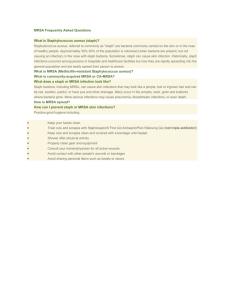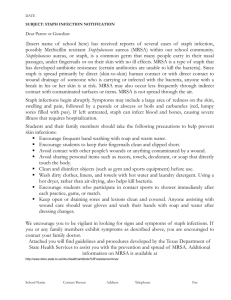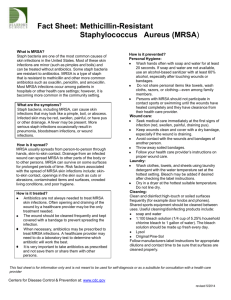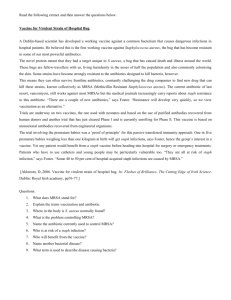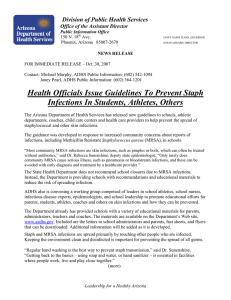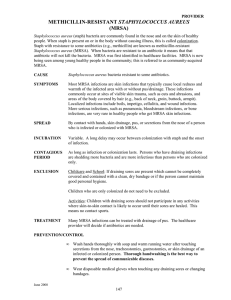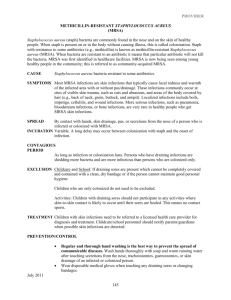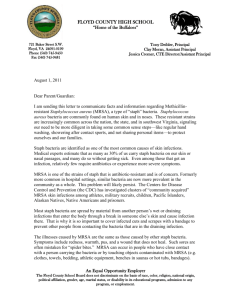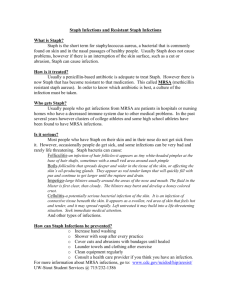HOW TO FIGHT STAPH
advertisement
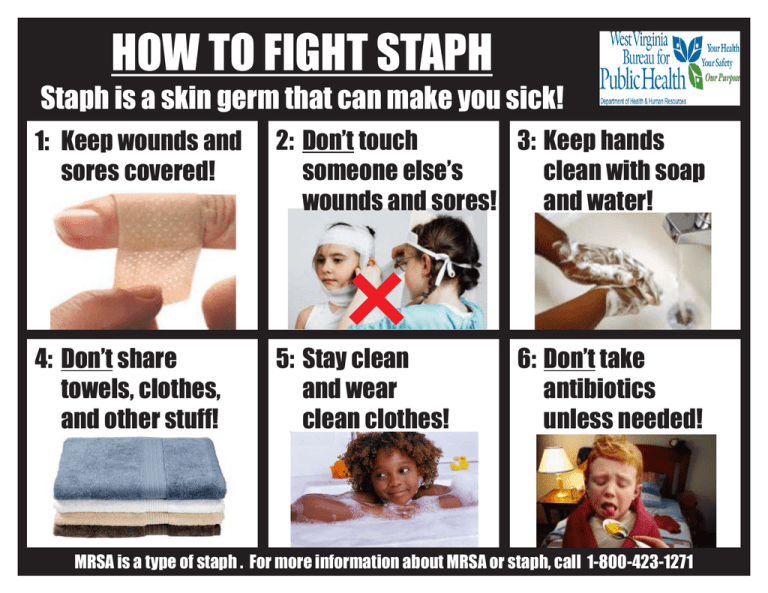
HOW TO FIGHT STAPH Staph is a skin germ that can make you sick! 1: Keep wounds and sores covered! 2: Don’t touch 3: Keep hands someone else’s clean with soap wounds and sores! and water! 4: Don’t share towels, clothes, and other stuff! 5: Stay clean and wear clean clothes! 6: Don’t take antibiotics unless needed! MRSA is a type of staph . For more information about MRSA or staph, call 1-800-423-1271 Information for Parents and Schools on MRSA and ‘Staph’ What is ‘staph’ (Staphylococcus aureus)? “Staph” are bacteria commonly carried on the skin or in the nose of healthy people. Staph bacteria are one of the most common causes of skin infections. Most of these skin infections are minor (such as pimples and boils) and can be treated without antibiotics. What is MRSA (methicillin-resistant Staphylococcus aureus)? MRSA is a type of staph bacteria that is resistant to some common antibiotics. MRSA has been present for a long time in hospitals and nursing homes. This health-care strain affects persons who are ill and the strain is resistant to many antibiotics. A newer community strain of MRSA commonly affects healthy persons and is not as resistant to antibiotics. This community strain is now the most common cause of skin infections in many communities in the U.S., including some communities in West Virginia. What does a staph or MRSA infection look like? Staph bacteria, including MRSA, can cause skin infections such as pimples or boils and can be red, swollen, painful, warm or have pus or other drainage. More serious infections may include pneumonia, bloodstream infections, surgical wound infections or other deep infections. How does one get a staph or MRSA infection? Staph and MRSA are most frequently spread by direct skin-to-skin contact. Here are some simple rules to protect yourself and others: o Wash hands regularly with soap and water or hand sanitizer. o Cover draining sores and wounds. If wounds are covered and drainage is contained, it is OK to go to work or school. o Don‟t touch anybody else‟s sores or wounds. o Shower or bathe regularly and wear clean clothes. o Don‟t share towels, washcloths, clothing, hats, razors, lotions, balms or other personal items. o Always talk to your doctor before taking antibiotics. If antibiotics are not necessary do not take them. If antibiotics are necessary, take them as directed. Are staph and MRSA infections treatable? Yes. Warm soaks and incision and drainage („lancing‟) are the basis for treatment of simple skin infections. If an antibiotic is prescribed, be sure to take the medication as directed. Do not share antibiotics with other people or save unfinished antibiotics to use later. Remember that many staph skin infections may be treated by draining the abscess or boil and may not require antibiotics. Consult your doctor for advice. How can I get more information? CDC information on MRSA in schools: o http://www.cdc.gov/Features/MRSAinSchools West Virginia Department of Health and Human Resources information: ohttp://www.wvidep.org/Portals/31/PDFs/IDEP/staphylococcus/preventing%20staph%2 0infections%20for%20players.pdf o http://www.wvidep.org/Portals/31/PDFs/IDEP/staphylococcus/preventing%20staph%20infectio ns%20in%20sports.pdf o http://www.wvidep.org/Portals/31/PDFs/IDEP/staphylococcus/Staphylococcus%20aureus%20f or%20parents%20and%20schools.pdf West Virginia Division of Infectious Disease Epidemiology • Phone: 304.558.5358 • Fax: 304.558.8736 • http://www.wvidep.org/ Page 1 of 1 October 2010
